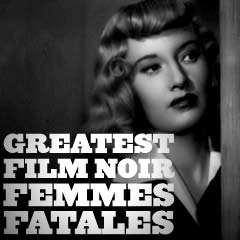
|
|
(chronological by film title) Introduction | Picture Guide | 1941 | 1944 | 1945 | 1946-1 | 1946-2 | 1947-1 | 1947-2 1948 | 1949 | 1950-1952 | 1953 | 1954-1956 | 1957-1959 |

|
Vertigo (1958)
Hitchcock's late 50s' film was a mesmerizing romantic suspense/thriller about a macabre, doomed romance. Although not technically a film noir, it has often been considered the last true classic film noir before the rise of neo-noirs. Its theme was desperate love for an illusion. Hitchcock's tale was an intense psychological study of a desperate, insecure man's twisted psyche (necrophilia) and loss of equilibrium. It followed the troubled man's obsessive search to end his vertigo (and deaths that resulted from his 'falling in love' affliction) and became a masterful study of romantic longing, identity, voyeurism, treachery and death. Other themes included female victimization and degrading manipulation, the feminine "ideal," and fatal sexual obsession for a cool-blonde heroine. In the film's opening, San Francisco ex-cop John "Scottie" Ferguson (James Stewart) was seen to suffer from a fear of heights (acrophobia) after a rooftop chase scene. He ended up hanging from a gutter - frozen by his debilitating fear of heights - he looked down many stories into the deadly abyss below and experienced a dizzying sensation called vertigo (symbolized by dizzying trick camerawork (a reverse zoom, dolly-out) visualizing the vortex of vertigo and acrophobia (fear of heights)). He was hired by his old college friend, the well-dressed, prosperous, handsome Gavin Elster (Tom Helmore), to trail his strange, potentially-suicidal wife around San Francisco (Elster asked: "Do you believe that someone out of the past, someone dead, can enter and take possession of a living being?"). Scottie's first view of the beautiful female was incredibly transcendental - she was half-seen in a striking close-up half-profile as she deliberately paused behind him in Ernie's Restaurant. He was transfixed by the face of ethereal, lovely, elegant blonde Madeleine (Kim Novak), the problematic wife.
He continually stalked Madeleine - he followed her into the art gallery at the California Palace of the Legion of Honor where he found her hypnotized, motionless and trance-like in front of a portrait painting of a woman named Carlotta Valdes, her ancestor's portrait. Scottie noticed that her single lock of swirling (vertigo-like) hair and hand-corsage bore a striking resemblance to the bouquet and hairstyle in the painting.
Scottie rescued the suicidal Madeleine at the Golden Gate Bridge, when she tore and threw flower petals from her Carlotta-like nosegay into the water, and then jumped into the cold waters of SF bay. He saved her from drowning and took her to his apartment where he first spoke to her. She was fearful and startled to find herself in a strange man's bed (and presumably naked). With a slight smirk - since he had previously seen her naked as he assisted her, Scottie chivalrously offered his maroon robe for her to wear. All the while, he became entranced and bewitched by her. They took a car trip together to the evocative, centuries-old redwood sequoias. In a dark, moody, giant redwood forest, in the filtered, impressionistic light of the woods where they wandered, she spoke about the ancient, towering trees over 2,000 years old - and how they reminded her of her own smallness and mortality. He noted: "Their true name is Sequoia sempervirens, 'always green, ever-living'." While pointing toward the concentric, spiraling rings in a cross-section of the stump of one of the felled trees in a display showing thousands of years of history (historical events, wars and treaties from 909 AD to 1930 when the tree was cut down), she indicated with a black-gloved finger the place where Carlotta's life had spanned a short period of time - she enigmatically traced the times of her birth and her death in one of the film's key speeches: "Somewhere in here I was born. And there I died. It was only a moment for you, you took no notice." In the next sequence when he again came under her mysterious spell and fell in love with her enigmatic beauty, Madeleine begged him to take her to "somewhere in the light" and they appeared on a Monterey Bay ocean cliff next to a classic Monterey pine. After telling him about a disturbing, ambiguous, symbol-filled dream, she became frightened and ran down the rocks to the water's edge where waves crashed in by the water's edge. He chased after her and they embraced and clung to each other as they kissed passionately. The turbulent waves crashed melodramatically into the rocks behind them as he pledged to protect her forever: "I'm here. I've got you...All the time!"
Soon after, Scottie and Madeleine drove and visited San Juan Bautista's Spanish Mission, about 100 miles south of San Francisco - hoping that visiting the real-world California mission would end her nightmares, cure her fears, dispel the dream's power, or prompt her memories. When they arrived, they kissed and he confessed: "I love you, Madeleine." She glanced across the courtyard toward the mission's church and bell tower, hurriedly confessed her own love for him, became frantic: ("There's something I must do...It's too late!"), and ran from him.
She ignored his attempts to comfort her with repeated kisses and promises and ran off across the courtyard toward the mission's church and bell tower. When he caught up to her, she again vowed to him: "Look. Let me go. Please let me go." In her final words to him, she explained how she had to go through with things as planned inside the church - alone. After one more kiss, she turned, looked up, and rushed into the church. He glanced up at the bell tower for an instant, and then decided to chase after her. She started to climb up the bell tower's crude, winding and rickety wooden staircase. In his pursuit, Scottie felt acute acrophobia and vertigo.
At the top of the tower, Scottie heard a shrieking scream as a gray-clothed body resembling Madeleine's was seen through a side tower window apparently falling to her death far below. Scottie looked down through the tower opening and saw a still body lying dead on the adjacent rooftop below - Madeleine had apparently committed suicide. He had been unable to prevent her 'suicidal' fall from a mission bell tower and subsequently suffered a nervous breakdown. Scottie had disturbing and distraught vivid nightmares following Madeleine's death - real nightmares, flashing lights, vivid, and shattered, exploding images, and a vision of a bottomless pit accompanied by a frightening silhouette of his body falling into the mission roof. Then when he happened to encounter a Madeleine look-alike on a San Francisco street outside a flower shop - a dark, red-haired woman named Judy Barton (also Kim Novak) who was wearing a tight green sweater dress - he pursued her. He learned she was a shop girl. And soon, he became obsessed into remaking her into the woman that he had lost by modifying and transforming her appearance, clothing, and hairstyle, with her reluctant approval ("If, if I let you change it, will that do it? If I do what you tell me, will you love me?"). There was a magnificent dream-like scene in her hotel room when Judy emerged from the bathroom in a sickly neon green light - transformed completely into Madeleine as the camera swirled around them. He saw the reborn reincarnation of his lost love. Anxious to please him because of her love for him, Judy slowly walked toward him like Madeleine would have. She assumed the actions, expressions and movements of "Madeleine" in order to please him and have him want her. From Scottie's point of view - the ghostly figure appeared bathed in the eerie green-tinged neon light reflected from the hotel sign outside the window. Her metaphysical, spiritual figure assumed solid shape as she moved out of the ghostly green light and crossed the floor to him, to surrender to him. They embraced and kissed passionately. The camera panned and swirled completely around them as they kissed, causing the walls of the room to appear to turn and change. Completely lost in the dream, overlapping fantasy and reality as Judy became one with Madeleine, Scottie also surrendered to her and she clung to him. The loving couple continued kissing passionately in front of the pale, greenish haze of the window. A striking moment came when Scottie was attaching a necklace around Judy's neck, and he realized that Judy was Madeleine (imagined in a momentary flashback of the necklace in the portrait and Madeleine gazing at it from a museum bench) -- he suddenly knew there was no Madeleine, and that he had been tricked by Elster. While trying to recreate the past, they traveled again to the mission, where Scottie asked agonizing questions as he dragged Judy into the mission and up the stairs of the mission tower after visiting a second time, to recreate the death scene of chasing Madeleine earlier when he had experienced his acrophobia and vertigo: "Did he train you? Did he rehearse you? Did he tell you exactly what to do and what to say? You were a very apt pupil, too, weren't you? You were a very apt pupil. Why did you pick on me? Why me?...I was the set-up. I was the set-up, wasn't I? I was a made-to-order witness." At the top of the tower, Judy confessed to plotting with Elster in the murder of his wife, but also sincerely professed that she still loved him even though he had been her victim. In the finale, footsteps of a black-clad figure in the shadows startled Judy, and she heard a dark, shadowy figure (a nun) say: "I hear voices." She backed away from Scottie gasping: "Oh, no!" Terrified, thinking and believing she was seeing the ghost of the murdered Madeleine (or the reincarnation of the ghostly doomed mother Carlotta Valdes), Judy recoiled and stepped backwards. During a second terrifying sequence in the bell tower, she accidentally fell through an opening in the tower and plummeted to her own death (off-screen) in an emotionally-shattering climax. The figure, actually a nun from the mission, crossed herself and murmured the last words of the film: "God have mercy." The last shot was of a stunned Scottie standing on the belfry tower ledge as he stared down at Judy's dead body in the tragic ending - Scottie had tragically loved and lost the same woman twice. |
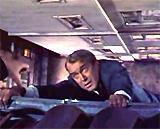  Scottie's Fear of Heights - Acrophobia with Vertigo   Profile of Madeleine (Kim Novak) in Restaurant 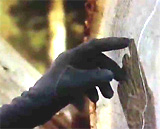 After Car Ride, Madeleine Tracing Rings in Giant Sequoia Tree 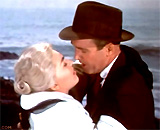 Madeleine and Scottie Kissing By the Ocean 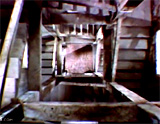 The "Vertigo" Effect  Scottie's Nightmares After Madeleine's Death 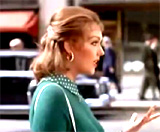 Shopgirl Judy (also Kim Novak) 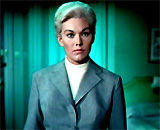 Judy Transformed into Madeleine 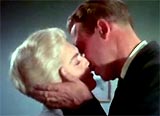 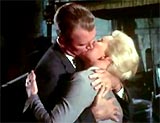 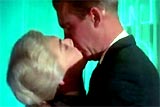 Kisses with Judy and a Swirling Camera  Startling Moment of Realization - The Necklace Second Visit to the Bell Tower 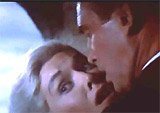 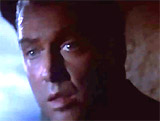   "God have mercy."   The Second Bell-Tower Sequence and Second Fatal Fall |
||||||||||||||||||||||||||
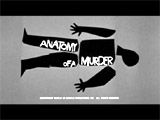
|
Anatomy of a Murder (1959)
Director Otto Preminger's daring courtroom drama was about an explosive rape and murder case. The plot was based on a real-life case that occurred in July of 1952 in the small town of Big Bay in the Upper Peninsula of Michigan, when returning Korean vet Lt. Coleman Peterson shot and killed tavern owner Mike Chenoweth, allegedly because Chenoweth raped Coleman’s wife, Charlotte. A plea of temporary insanity was argued for Peterson and he was freed of the charges after a trial. There were numerous concerns about the film's content (a rape trial), and various objectionable words. The Production Code of the time demanded that director Preminger excise the words sperm, sexual climax and penetration and restrict the use of the words panties and rape. The National Catholic Legion of Decency complained of the film's impropriety, and its screening in Chicago was delayed when censorship advocates argued that the words "intercourse," "contraceptive" and "birth control" needed to be deleted. A Federal judge ruled it was not obscene, however, because it did not "tend to excite sexual passion or undermine public morals." The film opened with Saul Bass' sytlized designs for the title credits. As the film commenced, country-styled, crafty, small-town defense lawyer Paul "Pauly" Biegler (James Stewart) was introduced as a Philadelphia ex-prosecutor and confirmed bachelor more interested in jazz piano and fishing than trying cases. He was with one of his closest associates Parnell McCarthy (Arthur O’Connell), an alcoholic colleague, when he received a phone call from Laura Manion (Lee Remick), asking him to defend her husband in an impending case and to speak to him the next morning. Before leaving for the jailhouse the next day, Biegler briefly spoke to his mocking secretary Maida Rutledge (Eve Arden). Biegler met the attractive wife Laura leaning on her car outside the jail. She displayed a right black eye behind her sunglasses (she claimed it was from a rape incident, although it was also probable her husband slapped her). In a private room, Biegler met with hot-tempered, rude and brutish Army officer Lt. Frederick "Manny" Manion (Ben Gazzara) from a nearby base. He had been charged with the first-degree murder of Barney Quill - the bartender and keeper-owner of Thunder Bay Inn who had allegedly sexually assaulted Laura Manion, his wife. An hour after his wife told him about the rape, he counter-attacked with pre-meditated, cold-blooded intent. Manion shot and killed Quill, and then turned himself in and was arrested for first-degree murder. Manion alleged that the murder was justified because Quill had raped her, but the time element was a major issue. At first, Biegler suggested that Manion plead guilty and ask for mercy, and hope for the jury's sympathy. But then when Manion said: "I must have been mad..I mean, uh, I must have been crazy," Biegler thought that might be a possible avenue to argue.
The innocently-portrayed, yet slightly trampy-acting Laura spoke to Biegler about the night of the attack and what she was wearing: "In a sweater, like this, and a skirt...Underneath? I had on a slip and panties and a bra....I don't need a girdle. Do you think I need a girdle?..." She had been offered a ride home after leaving the bar at 11 pm, but her trailer park auto gate was locked. She then described Quill's rape-attack upon her in his car parked off the road on a lane in the woods. He hit her, tore off her panties, and then raped her:
However, a doctor had examined Laura and said he didn't think she had been raped. She shot back: "I don't care what the doctor thought, a woman doesn't mistake these things." [Note: There was always the possibility that Laura was bartender Quill's lover and that Manion killed him and beat her up when he discovered them together.] Hired to represent and defend Manion, Biegler took a strategic tactic - he urged his client to claim that he had no memory of the homicide (even though five shots were fired) and to plead temporary insanity (or "irresistible impulse") - a blinding rage that made him powerless to stop him from committing the murder.
Shortly later, Laura and Biegler had a lengthy open-car conversation, when she admitted her husband was always insanely jealous of her looks, and she was afraid of him. She confessed:
Biegler received a definitive answer to his repeated, pointed question before the trial: "Does your husband have any reason to be jealous?" She coyly answered: "No, not once, not ever."
While researching the case, Biegler visited the bar at Thunder Bay and learned that the pretty hotel manager Mary Pilant (Kathryn Grant) had recently moved there two years earlier from Canada, and was now bound to inherit the place. When Biegler asked her about the rape, she claimed she knew nothing about it ("I don't know what happened with Lt. Manion's wife so there really isn't anything for me to explain...Barney was well-liked here by everyone, Mr. Biegler). She became upset by Biegler's insinuation ("It's very generous of everyone to overlook his little faults, like raping other men's wives"), became upset, and left the table.
Biegler became concerned when he witnessed his client's soused wife Laura at a roadhouse party dancing with some GIs. He whisked her away and ordered her to return home immediately: ("I'm the lawyer trying to beat the rap for your husband. Do you remember?"). He implicitly ordered her to stay away from men and party-places, and wear a girdle in order to play the part of a "meek little housewife" rather than that of a happy-go-lucky party girl. He also specifically suggested that she must act demurely before and during the trial, and that she should visit her husband at the jail more often:
She consented to wearing more appropriate formal clothing (a baggy woman's suit), horn-rimmed glasses, and a hat in court. However, after he drove her to her trailer park, she said she was very lonely in the trailer all by herself: ("I had to get out of that trailer. I couldn't stand being cooped up all the time. I'm-I'm lonely, Paul. I'm awful lonely. I wouldn't have gone to that roadhouse if it weren't for that, you know?"). She also stated off-handedly that she would be happy if her husband was convicted, because she could then be free of him: ("You mean you think maybe Manny won't get off?...If he didn't, it'd be one way to end it. No, I don't mean that. I may think it sometimes, but I don't really want it"). Detroit army psychiatrist Dr. Matthew Smith (Orson Bean) was later to testify that two days before the trial opened, he had diagnosed that Manion was suffering from "dissociative reaction" (the "irresistible impulse" or "temporary insanity" defense that Biegler wanted). The crux of the case that Beigler planned to argue hinged on a precedent established in an 1886 Michigan Supreme Court ruling (in People v. Durfee) that a defendant was forced to commit a crime because of an "irresistible impulse" he could not control: ("Nevertheless, if he was forced to its execution by an impulse - by an impulse, which he was powerless to control, he will be excused from punishment"). During the melodramatic, sensationalist courtroom scenes and deliberations, the crafty Biegler was pitted against two lawyers: the local DA Mitch Lodwick (Brooks West), and flamboyant, tough "big city" co-counsel and assistant prosecuting attorney Claude Dancer (George C. Scott). Dancer and the prosecution wished to block any mention of Manion's motive for killing Quill - the raping of Laura. A doctor's testimony brought up touchy subjects such as the fertility of the sperm of Quill: ("Spermatogenesis was occurring at the time of death"), and Beigler clarified: "In other words, the deceased, in life, was not sterile. He could produce children." Also, determinations regarding intercourse were also made in the post-analysis - the doctor reported that there was no evidence that Laura had been raped: ("There could be several reasons why the test on her was negative. The use of a contraceptive, or possibly, there was no completion on the part of the man"). However, Biegler eventually was able to persuade level headed, even-tempered Judge Weaver (real-life Boston lawyer Joseph Welch in his only screen appearance (famous for asking in the Army-McCarthy hearings in 1954 - "Have you no decency at last, sir?")) to rule in his favor and get Laura Manion's rape issue into the record, when in a monologue, he described how the shooting and killing of Quill was triggered by Manion's "temporary insanity":
After a few pregnant moments after he wound his watch, the Judge made a decision to allow the motive for the murder into the case: "Objection overruled." During questioning, it was alleged that Quill beat and raped Laura - and afterwards, Manion - under an "irresistible impulse," had calmly walked to the tavern about an hour later, and committed the crime with five shots of a gun. Was he legally sane or insane? Later in the testimony regarding the alleged rape, another doctor testified: "It's impossible to tell if a mature, married woman has been raped....Insofar as no sperm was present, it didn't appear that she had had recent relations with a man...Violation is sufficient for rape. There need not be a completion." Dancer's strategy was to paint Laura as a trampy, loose, provocative and seductive adulteress who wore tight clothing to entice men. In response, Biegler had Laura show off her beauty as a point in his favor: "It's pretty easy to understand why her husband became temporarily deranged, when he saw such beauty bruised and torn by a beast." During a break in the trial, Biegler spoke again to Mary Pilant about her father, and also heard again from the bartender Al Paquette (Murray Hamilton) who had witnessed the murder. The lawyer, hypothesizing that Paquette was covering up for the rape, attempted to persuade Paquette to testify that Quill had indeed raped Laura, but he refused: ("Barney wouldn't hurt a woman").
When Laura took the stand, Dancer was able to get her to divulge on the record that she was previously married, and tied the knot with Manion three days after her divorce. He also made 'veiled suggestions' about her frequent flirtatious behavior:
The trial contained daring details, testimony, and evidence regarding contraceptives, rape charges, and the entering into evidence of white or pink nylon lace "lost panties" (allegedly torn off by Quill): "Do you always wear panties?...Since they've not been found, I submit that it's possible she wasn't wearing any and has forgotten." Dancer suggested that Laura hadn't worn panties that night, and that she lied about being raped to prevent her insanely jealous husband from beating her:
Damning but unreliable testimony was provided by Manion's cellmate Duane "Duke" Miller (Don Ross) who claimed that Manion had told him that he had fooled everyone in court and then he made a shocking statement about what Manion also said: "He said that when he got out, the first thing he was gonna do was to kick that bitch from here to kingdom come." Biegler had Manion testify that he had never beaten his wife at any time. It was also verified by the last witness, inn manager Mary Pilant who was the sole heiress of the Thunder Bay Inn, that she had found Laura's missing (and torn) white laced panties the next day in the laundry chute near Quill's room. Supposedly, Quill had dropped them down the laundry chute when he returned home. Dancer argued that Mary was lying - he assumed that she was Quill's mistress ("Are you Barney Quill's mistress?") and that she had sought jealous revenge against Quill's interest in Laura. The most shocking revelation of the case reversed Dancer's theory - Quill was actually Mary's father and she was his illegitimate daughter. In the quick conclusion to the case, Manion was found not guilty (by reason of temporary insanity at the time of the shooting). He unexpectedly left town with Laura (who was seen crying) - with only a note for Biegler, explaining that he was seized by an "irresistible impulse" to leave. Evidence at the trailer park in the trash barrel suggested that Manion was a heavy gin drinker who beat Laura before they left (the reason for her tears). The film ended with a mystifying possibility that the Manions had duped everyone - it was highly probable that Laura's sexual encounter with Quill was consensual (and not rape) and that Manion had killed Quill out of drunken jealousy. |
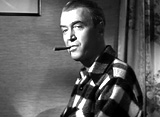 Introduction of Defense Lawyer Paul Biegler (James Stewart) 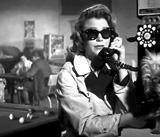 Laura Manion (Lee Remick) Calling Biegler to Ask Him to Defend Her Husband 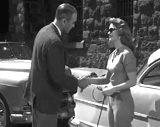 The Next Morning: Biegler With Mrs. Manion 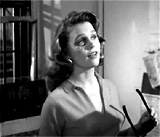 Manion's Trampy Wife Laura with Black Eye 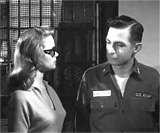 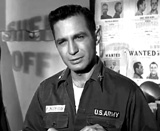 Accused Suspect Lt. Frederick Manion (Ben Gazzara) in Jailhouse 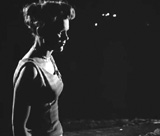 Laura's Off-Handed Wish For Her Husband to be Convicted 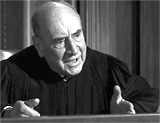 The Court's Judge Weaver (Joseph Welch) 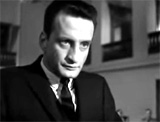 Assistant Prosecuting Attorney Claude Dancer (George C. Scott) 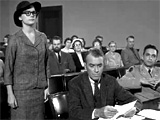 Mrs. Manion Dressed Appropriately at the Trial  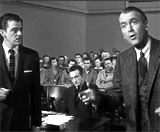 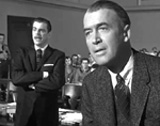 Paul Biegler (James Stewart) in the Courtroom: "I beg the court to let me cut into the apple" 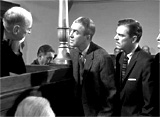 Conferring with the Judge Regarding Laura's Undergarments: "Panties" 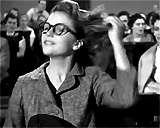 Laura Asked to Unveil Her Hair in Court 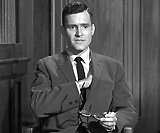 Psychiatrist Dr. Smith (Orson Bean) Testifying About Manion's "Dissociative Reaction" 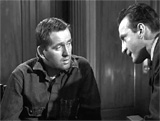 Cellmate Miller's Startling Confession 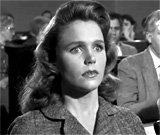 Laura's Reaction to Miller's Derogatory Statement 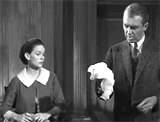
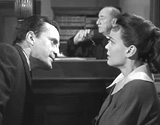 Mary Pilant: "Barney Quill Was My Father" 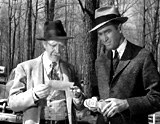 Manion's Farewell Note About an "Irresistible Impulse" 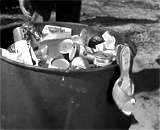 Manions' Trash Barrel |
||||||||||||||||||||||||||